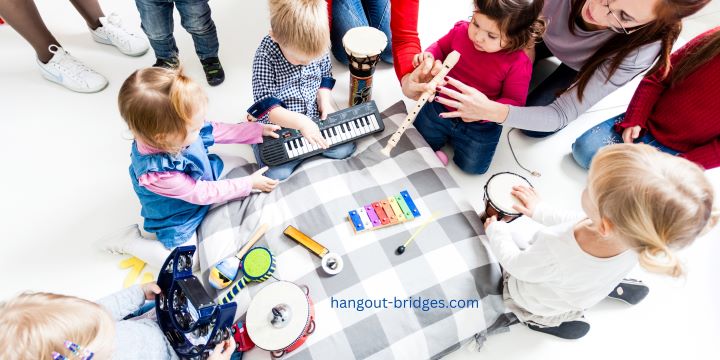Table of Contents
- Introduction to Music Education
- Benefits of Music Education
- Music and Cognitive Development
- Emotional and Social Benefits
- Real-Life Examples of Music Programs
- Challenges Facing Music Education
- How to Support Music Education
- Conclusion
Music education plays a crucial role in student development by enhancing cognitive abilities, improving memory, and fostering creativity. It helps students develop discipline, patience, and perseverance. Additionally, music education encourages emotional expression and social interaction, contributing to improved mental health and well-being. These benefits extend to academic performance, with students often showing better results in subjects like math and reading, leading to a more well-rounded and holistic educational experience.
Introduction to Music Education
Music education plays a vital role in students’ holistic development. Through structured programs, children can learn various musical instruments, understand musical theory, and develop skills that transcend the music classroom. Accessible music resources are essential to fostering this development and ensuring that students can benefit from music education.
Understanding the multifaceted advantages of music education can help educators, parents, and policymakers advocate for its inclusion in school curriculums. These benefits extend beyond simply learning to play an instrument and can have lasting positive effects on a student’s overall development. By integrating music education into the curriculum, schools can cultivate a more enriched and balanced educational experience that prepares students for future success.
Benefits of Music Education
Engaging in music education offers numerous benefits for young minds. Research indicates that students involved in music score higher on standardized tests and exhibit improved academic performance overall. Time management and organizing abilities can be improved by exercising the discipline and patience to master an instrument.
Moreover, music education can improve language development, memory, and critical thinking skills. Music’s rhythm, pitch, and melody aspects aid in developing phonological awareness, which is crucial for reading and language acquisition. Additionally, the collaborative nature of music ensembles teaches students critical social skills and builds a sense of community within the school environment.
Music and Cognitive Development
Music education has been linked to cognitive development in various ways. For instance, reading musical notes can boost mathematical abilities and develop spatial-temporal skills. Moreover, playing an instrument requires coordination and enhancing fine motor skills.
Students who engage in music education often display better attention and memory, which can translate to improved performance in other academic areas. The repetitive practice and intricate nature of learning an instrument can also foster better problem-solving abilities and perseverance. These cognitive benefits are complemented by the emotional satisfaction and sense of achievement of mastering a piece of music, creating a well-rounded developmental experience.
Emotional and Social Benefits
Beyond academics, music education significantly impacts emotional and social growth. Becoming a member of a band or chorus promotes camaraderie and teamwork. Moreover, performing in front of an audience can help build confidence and reduce anxiety.
Music can be an emotional outlet for students, allowing them to express and process their feelings healthily. It can also teach empathy and improve social skills by encouraging peer collaboration and understanding. Early exposure to music can foster a more balanced social and emotional development and a lifetime appreciation for the arts.
Real-Life Examples of Music Programs
Many schools worldwide implement successful music programs that serve as models for others. For example, the El Sistema program in Venezuela has provided music education to thousands of children, primarily from underprivileged backgrounds, achieving remarkable social integration and academic success.
Similarly, programs like Music Unites in the United States have focused on providing music education to at-risk youth, demonstrating how music can positively influence students’ lives and futures. These programs showcase the transformative power of music education and the profound impact it can have on individual students and their communities.
Challenges Facing Music Education
Despite its benefits, music education faces several challenges. Budget cuts in school funding often result in the elimination of music programs, leaving many students needing access to this valuable educational resource. Additionally, there is an ongoing debate about the efficacy of music education in improving academic performance, with some arguing that the focus should be on subjects like math and science.
Another barrier is the lack of trained music educators, which can limit the quality and availability of music programs. These problems must be addressed to ensure every student benefits from music training. Community support, advocacy, and innovative funding solutions are required to sustain and improve school music education programs.
How to Support Music Education
- Advocate for music programs in schools by attending school board meetings and voicing your support. Your active involvement may change the financing and resources for music education.
- Donate instruments to local music programs or charities. Your contributions can provide valuable resources to students needing access to musical instruments.
- Volunteer to help with school music events and programs. Your time and effort can significantly enhance the quality and reach of these programs.
- Encourage your child to participate in music classes and extra-curricular activities. Support their musical interests and provide opportunities for them to explore and grow in this field.
- Support organizations dedicated to music education. Your involvement and contributions to these organizations can help them continue their mission of providing music education to all students.
Conclusion
In conclusion, music education offers many benefits beyond just learning to play an instrument. It fosters cognitive, emotional, and social growth, equipping students with valuable skills in various aspects of life. By overcoming the challenges and supporting these programs, we can ensure that music education continues to benefit future generations.
The collective effort of educators, parents, policymakers, and the community is vital in preserving and enhancing music education. By recognizing and advocating for the importance of music in schools, we can create a more enriched and balanced educational experience for all students. Let’s work together to keep the rhythm of music education alive and thriving for years to come.





